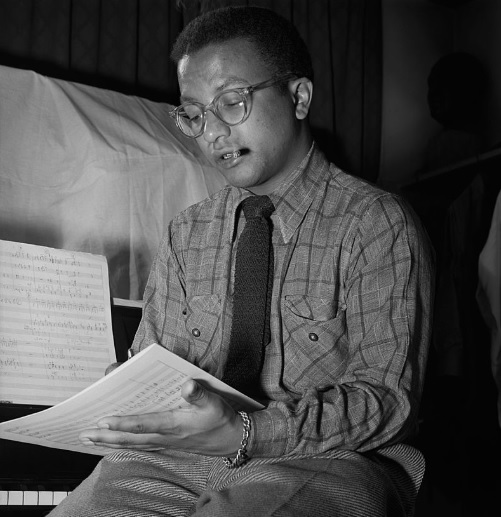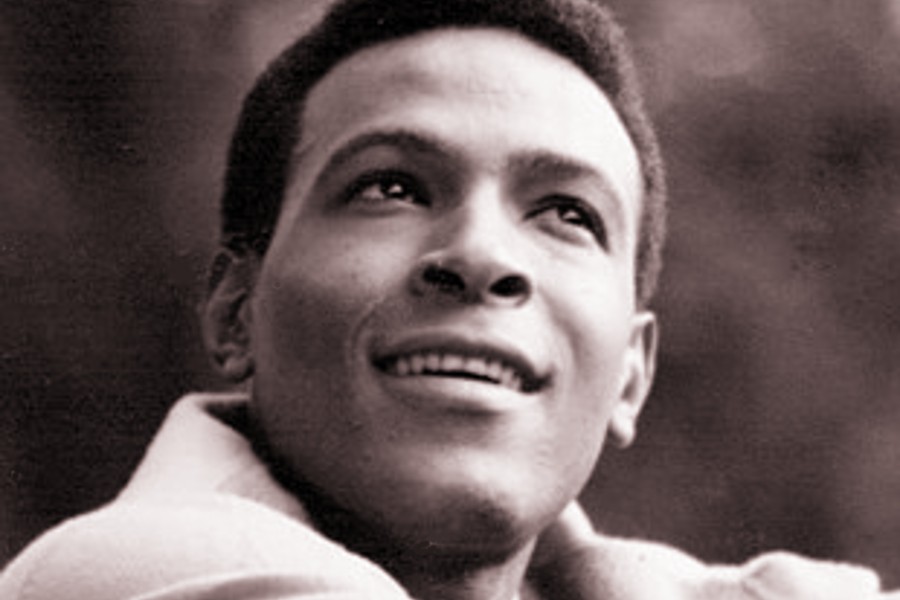 The Library of Congress announced today that it has acquired the original manuscripts documenting the work of composer, arranger and pianist Billy Strayhorn. An important star in the jazz firmament, Strayhorn was the source of much of the sound of the Duke Ellington Orchestra. He worked with Ellington for nearly 30 years, writing or collaborating on more than 200 tunes and arrangements for the band. Strayhorn wrote the orchestra’s signature tune, “Take the ‘A’ Train.”
The Library of Congress announced today that it has acquired the original manuscripts documenting the work of composer, arranger and pianist Billy Strayhorn. An important star in the jazz firmament, Strayhorn was the source of much of the sound of the Duke Ellington Orchestra. He worked with Ellington for nearly 30 years, writing or collaborating on more than 200 tunes and arrangements for the band. Strayhorn wrote the orchestra’s signature tune, “Take the ‘A’ Train.”
Here’s “Take the ‘A’ Train,” with Strayhorn and the Duke Ellington Orchestra:
The Strayhorn Collection contains nearly 18,000 documents, which include music manuscripts, lyric sheets and scripts, financial and business papers dating from the 1940s, and photographs from the 1930s through the 1960s. The richest portion of the collection is approximately 3,000 music manuscripts in Strayhorn’s own handwriting, including lead sheets, piano-vocal scores and complete orchestrations. These include compositions written solely by Strayhorn or in collaboration with Duke Ellington. The collection also has a wealth of sketch materials that were apparently unused or have remained unidentified.
Collection highlights include:
- Original manuscripts for hundreds of songs, including “Take the ‘A’ Train,” “Lush Life,” “Something to Live For,” “Chelsea Bridge,” “Rain Check” and “King Fit De Battle of Alabam”;
- Original manuscripts for musicals “Beggar’s Holiday” and “Rose Colored Glasses”;
- Contracts and other documents concerning Strayhorn’s business dealings with the American Society of Composers, Authors, and Publishers;
- Contracts for individual works including “Absinthe,” “Blossom,” “Christmas Present,” “Love Came,” “Passion Flower,” “Rosebud,” “Tigress” and “Watch Your Cue”;
- Autographed letter to Strayhorn from longtime partner Aaron Bridgers (1954);
- Autographed letter to Strayhorn from Luther Henderson (1966);
- Autographed essay, “Harmony,” examining Strayhorn’s approach to music writing, especially jazz, and compositional technique (undated);
- Two of Strayhorn’s personal address books and passports.
Although classically trained, Billy Strayhorn is better known for his work in jazz. “His contribution to American music since the 1940s has been enormous,” said Larry Appelbaum, the Library of Congress Music Division’s jazz specialist. “The Billy Strayhorn Collection documents the creative work of a musical architect of the highest order who spent most of his adult years working behind the scenes in the shadow and employ of Duke Ellington. Unlike many other musical geniuses, Strayhorn did not seek the limelight or attention, but scholars, performers, composers, and arrangers — for the first time in 50 years — will finally have full public access to someone who added greatly to the brilliance and beauty of 20th-century music.”
Born on Nov. 29, 1915, in Dayton, Ohio, Strayhorn spent most of his formative years in and around Pittsburgh, where his family moved when he was about five years old, and in Hillsborough, North Carolina, the home of his mother’s family. He began taking piano lessons at an early age, followed by harmony instruction. He was composing in his teens and produced the musical “Fantastic Rhythm” in 1935 at the age of 19. Strayhorn continued to develop his skills as a composer and pianist, aspiring toward a career in classical music. He completed his first classic, “Lush Life” in 1936 when he was 20.
Strayhorn was 25 when he met bandleader and composer Duke Ellington in 1938. A month later, he began his 28-year association with Ellington. The multi-talented Strayhorn wrote or collaborated on some of the band’s biggest hits and also arranged a substantial part of the Ellington Orchestra’s repertoire. He also occasionally served as lyricist, vocal coach and second pianist in the orchestra. He died at the age of 51 on May 31, 1967.
The great jazz composer/arranger Billy Strayhorn lived in a ground-floor apartment in this Harlem rowhouse at 315 Convent Avenue with his partner, jazz pianist and composer Aaron Bridgers, from 1939 to 1948. Strayhorn stayed here until 1950 after Bridgers moved to Paris.
The great jazz composer/arranger Billy Strayhorn lived in a ground-floor apartment in this Harlem rowhouse at 315 Convent Avenue in Harlem, NY, with his partner, jazz pianist and composer Aaron Bridgers, from 1939 to 1948. Strayhorn stayed here until 1950 after Bridgers moved to Paris.
Since Strayhorn’s death, his original manuscripts have been in the custody of the Strayhorn family and have been available only for limited scholarship. The acquisition of the Billy Strayhorn Music Manuscripts and Estate Papers will enhance the Library’s existing materials documenting Strayhorn’s legacy. Foremost among these are the original manuscript scores for his first musical, “Fantastic Rhythm” and the 1941 musical co-written by Strayhorn and Ellington, “Jump for Joy.”
In addition, the Library has in its collections 50 songs composed by Strayhorn that were registered for copyright during the period of 1941-1969 and 51 compositions by Strayhorn and Ellington that were submitted for copyright from 1939-1965. All of these materials will be available in the Music Division’s Performing Arts Reading Room on Capitol Hill in Washington, D.C.
A finding aid for the Strayhorn collection can be found here.
Photo credit: American jazz composer, pianist, lyricist, and arranger Billy Strayhorn from Wikipedia.
Become a Harlem Insider!
By submitting this form, you are consenting to receive marketing emails from: Harlem World Magazine, 2521 1/2 west 42nd street, Los Angeles, CA, 90008, https://www.harlemworldmagazine.com. You can revoke your consent to receive emails at any time by using the SafeUnsubscribe® link, found at the bottom of every email. Emails are serviced by Constant Contact








